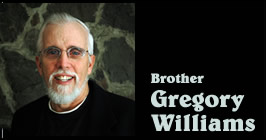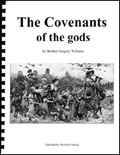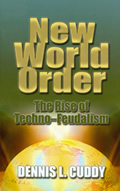by Brother Gregory
Williams
March 21, 2010
NewsWithViews.com
God gave man the right to choose. Man gave government the right to choose for him. Those who use to be called representatives are known today as lawmakers.
We live in a changing world and are often changed by the world we live in. Not only are people organic, but society, language and constitutions are organic and regularly change. We live in a cause and effect universe, and as we change things around us, we are changed by those things.
Most people can tolerate slow change but sudden change or reversal of what we have come to believe as true can shake the foundation of our thinking like an earthquake. Some experienced this when we first suggested that Romans Chapter 13 would be better understood if it was read:
“Let every soul be subject unto the higher liberty. For there is no liberty but of God: the liberties that be are ordained of God. Whosoever therefore resisteth (opposes) the liberty, resisteth (opposes) the ordinance of God: and they that resist (sets one's self against) shall receive to themselves damnation. For rulers are not a terror to good works, but to the evil. Wilt thou then not be afraid of the liberty? Do that which is good, and thou shalt have praise of the same.” Romans 13:1-3
The claim that Paul is saying that we should be at liberty is a bold accusation against the doctrines of much of modern Christendom. Of course none of this suggests that the first English translation of the Bible are wrong because the Greek word exousia used in these verses does mean power. The problem is that it is one of a half dozen Greek words translated into power. The question is “power” in what sense and which definition of the word “power” should be applied. Have the people been steadily deceived, by either negligence or design, arrogance or ignorance? It was prophesied that they would be.
A central theme throughout the Bible is to set men free. Although the use of words changes over time the Greek Glossary of Aristotelian Terms states that exousia means “right.”[1] Aristotle actually exemplifies its use in the statement, “The right (exousia) to do anything one wishes...”[2]
In Plato's notes the “Greek words for freedom (are) eleutheros (liberal/Free), exousia (Freedom/Power to do something) ...”[3]
While Plato and Aristotle's definition of the word exousia was from a classical Greek period, their opinion was still in conformity with the second century A.D. Cynic philosopher, Enomaos, whose writings were preserved by Eusubius. Aldo Brancacci examines the definition of 'freedom' in his 'Liberta e fato in Enamao di Gadara' where exousia is “used by Enomaos to refer to human freedom...which expresses 'the new concept of freedom in opposition to the already defunct and unhelpful eleutheria'.”[4] For at least five centuries the word exousia consistently referenced human liberty and freedom with the Greek term exousia.
God sent Abraham, Moses, Joshua, Samson, Gideon and a host of others to set us free in truth. Jesus came to set us free in spirit and truth and we would be free if we did what He said. It seems a slave mentality to believe that we can only be “free at last, free at last”[5] when we are dead.
“If the Son therefore shall make you free, ye shall be free indeed.” John 8:36
Dissenting comments on our books and articles might be exemplified by those of Professor Ardel Caneday of New Testament Studies & Biblical Theology at Northwestern College, in Saint Paul, Minnesota.
Ardel attempted to discredit Tim Case[6] who quoted extensively from one of our early NewsWithViews articles on Romans 13 in his own article A Peccancy.
Ardel states that Case commits “fallacy” by giving the etymology of the word. At the same time Ardel seems to disregard Aristotle, Plato, Enomaos, Brancacci and Bryn Mawr's Classical Review with a vague reference to Koine Greek.
Koine Greek developed as the world of the Greeks and Romans went from free Republics to a dictatorial empire. Those governments of men made instruments of war, took the first fruits of the people, and even their sons and daughters for their own purposes. They brought about famine, wars, and pestilence that killed off millions of people. This is a pattern that history continues to repeat as we meet our own future in the present conditions of this world.
If you give men the power to choose for you they will be corrupted by that power and society will be weakened and debased. God wants us to be free souls under His authority, not human resources and merchandise for the Pharaohs and Nimrods of the world.
Most scholars are entrenched in the presumption that they could not be in error much less under a strong delusion. The people are often a victim of this same malignant malady. Pride is contagious.
All interpretations of the Gospel may not be gospel. There were many scholars among those who crucified Christ. Satan has always deluded the scholars first. It makes his job so much easier when the scholars are on his side.
Saul, who became Paul, went to the best school and had the most respected scholar as his teacher. [7] The educated Saul did not know Christ nor the Gospel of the Kingdom and even persecuted Christ's followers. Paul, through revelation, eventually counted all he had known before Christ as little more than dung.[8]
Ardel
also suggests that Case “appeals to one of the word's lesser used
meanings in the New Testament to render that unlikely meaning the meaning
of the word in Romans 13.” We must ask, lesser used by whom?
Joseph Thayer's first definition of the Greek word exousia is
the “power of choice, liberty of doing as one pleases”. It
is not until the fourth definition that we see anything like “the
power of rule or government.”[9]
The truth is most
modern scholars choose not to use the primary meaning of the word exousia
because it would be an indictment of the condition of the modern Church
and the state to which it has brought the people it was meant to serve.
Ardel goes on to suggest that Case “fails to show that the New Testament regularly employs [exousia] to refer to ruling authorities, as it clearly does in Romans 13.”
The Greek word exousia appears over 90 times in the biblical text. At least 12 times it is speaking of an individual's, personal right or liberty. Over 50 times exousia is found in verses speaking of the “power” of God and Jesus the Christ, the anointed King, who appointed ambassadors and was proclaimed king by thousands of people including Pontius Pilate.[10]
More than a dozen times the word exousia is specifying a jurisdictional right to judge or a conflict of law between man's government or the “adversary” and the Kingdom of God. If people are insistent upon using Thayer's fourth definition of exousia “the power of rule or government”, they should be willing to apply it to Christ's government and its jurisdictional right as one form of government.
Those who proclaimed Jesus as the Christ were proclaiming Him as their king.[11] Christ sealed that Roman proclamation, nailed to the cross, in His own blood. Christians were able to live, worship and serve God, unless the people rejected Christ and chose to go under the authority or power of another by application and consent.
“Wherefore if ye be dead with Christ from the rudiments of the world, why, as though living in the world, are ye subject to ordinances,” Colossians 2:20
In Matthew 8:9 and Luke 7:8 the word exousia is used concerning an officer's right to direct his men. That power comes from the contract his soldiers signed when they became members under his authority. The bondage of Egypt, from which Moses freed the people, was the result of their application, participation and the agreements they made in exchange for benefits and protection of the Egyptian government.
The Church was appointed by Christ so that the people did not have to apply/pray for assistance from mendacious benefactors who exercised authority. The church is another form of government and defined that way in legal dictionaries. If the Church set the table of the Lord according to the perfect law of liberty the people would still be at liberty because they would not have to eat at the table of rulers.[12]
Modern preachers have removed the “Kingdom” at hand from the “Gospel of the Kingdom of God”[13] and turned the hearts of the people to impure religion of the state. The Pharisees were scholars and the majority of the Pharisees voted to kill Christ, [14] their rightful King.[15] They chose to have no king but Caesar.[16] Thank Heaven, the truth is not dependent upon democracies or scholars.
The modern Christians have arranged a world[17] system, a mystery Babylon, where their ministers teach the people to sing in their churches, praising Christ as King, but send the people to pray for their daily bread and benefits to men of the world “who call themselves benefactors but exercise authority one over the other.”[18]
The people do take a bite out of their neighbor, devouring one another under the license of the government.[19] The people wave their hands on Sunday and give lip service to God, but the rest of the week they covet their neighbor's goods through their socialist schemes of government.
Applying to the Pharaoh for their daily bread brought the Israelites into bondage. God led the people out of that bondage and told them never to return that way. God even told the people if they chose a ruler they were to write in their constitution that he could never do anything that would return them to the bondage of Egypt.[20]
Common sense would require us to ask why Paul would be telling the people to remain in an Egyptian style governments rather than be free. Remember Christ came to take the Kingdom[21] away from those who ruled over the people.[22] Those rulers had taken away the liberties granted by God,[23] put heavy burdens on them, and through their system of social security had made the word of God to none effect [24] because their system was not based on charity.
| Subscribe to the NewsWithViews Daily News Alerts! |
Since, freeing people in Spirit and truth and living by faith has always been the mission of the prophets of God, it seems clear that Paul was saying that we should remain subject to liberty and the right to choose endowed by God. Paul understood the perfect law of liberty,[25] and to oppose liberty is to oppose the will of God. If your ministers do not understand that, then maybe they do not understand Paul or Christ.
From the Book The Higher Liberty.
Footnotes:
1.
Aristotle's
Political Theory
2.
Lawmakers
and Ordinary People in Aristotle, by Paul Bullen (1996) (VI. 4.1318b38-1319a4)
3.
Plato
Notes
4.
Bryn
Mawr Classical Review 2001.08.19 On this issue, see S. Bobzien, Determinism
and Freedom in Stoic Philosophy, Oxford 1998, chap. 6.
5.
From a Negro spiritual “Free at Last” originally sung by slaves
at funerals.
6.
A
Discredited Case: A Matter of Word Fallacy, Friday, June 12, 2009.
7.
Acts 22:3 “ I am ...brought up... at the feet of Gamaliel, [and]
taught according to the perfect manner of the law ...”
8.
Philippians 3:8 “Yea doubtless, and I ... do count them [but] dung...”
9.
The New Testament Greek Lexicon based on Thayer's and Smith's Bible Dictionary
plus others; this is keyed to the large Kittel and the "Theological
Dictionary of the New Testament." Define the word exousia:
1- power of choice, liberty of doing as one pleases
2- physical and mental power
3- the power of authority (influence) and of right (privilege)
4- the power of rule or government (the power of him
whose will and commands must be submitted to by others and obeyed)
10.
“Pilate wrote a title...JESUS OF NAZARETH THE KING OF THE JEWS...
in Hebrew, and Greek, and Latin...” John 19:19
11.
Acts 17:7 “Whom Jason hath received: and these all do contrary to
the decrees of Caesar, saying that there is another king, [one] Jesus.”
12.
Proverbs 23:1-3; Psalms 69:22; Romans 11:9; Exodus 34:12; Deuteronomy
7:16; Jeremiah 5:25-28; Proverbs 1:10-33; Micah 7:1-3; Galatians 5:1;
2 Peter 2:18-22.
13.
“And Jesus went ... preaching the gospel of the Kingdom....”
Matthew 4:23. Mark 1:14.
14.
Mark 15:13 “And they cried out again, Crucify him.” [Luke
23:21]
15.
John 19:6 “... Pilate saith unto them, Take ye him, and crucify
him: for I find no fault in him.”
16.
John 19:15 “... Pilate saith unto them, Shall I crucify your King?
[They] answered, We have no king but Caesar.”
17.
In the New Testament kosmos [ kosmov] is most often translated world and
defined as “an apt and harmonious arrangement or constitution, order,
government” See “A Kingdom not of this world” in The
Higher Liberty”.
18.
Luke 22:25 “...The kings of the Gentiles exercise lordship over
them; and they that exercise authority upon them are called benefactors.
But ye shall not be so:...” [Matthew 20:25; Mark 10:42]
19.
“...this [city is] the caldron, and we [be] the flesh... prophesy
against them, prophesy, O son of man...This [city] shall not be your caldron,
neither shall ye be the flesh in the midst thereof ...” Eze 11:3-11
20.
Deuteronomy 17:16 “... nor cause the people to return to Egypt,...
Ye shall henceforth return no more that way.... he shall write him a copy
of this law in a book ... and he shall read therein all the days of his
life:”
21.
Matthew 21:43 “...The Kingdom of God shall be taken from you, and
given to a nation bringing forth the fruits thereof.”
22.
Luke 11:46 “...Woe unto you also, ye lawyers! for ye lade men with
burdens grievous to be borne...” [Matthew 23:4]
23.
The
Corban of the Pharisees
24.
Mark 7:13 “Making the word of God of none effect through your tradition,
which ye have delivered: and many such like things do ye.” Corban
of the Pharisees
25.
James 1:25 “But whoso looketh into the perfect law of liberty, and
continueth [therein], he being not a forgetful hearer, but a doer of the
work, this man shall be blessed in his deed.”
� 2010 Brother Gregory Williams - All Rights Reserved
Sign
Up For Free E-Mail Alerts
E-Mails are used strictly for NWVs alerts, not
for sale
Brother Gregory was born in America in 1948. His father was a practicing attorney and his mother the daughter of Norwegian immigrants. He Married in 1973, and is the Father of 6 children with a growing number of grandchildren. He grew up in southeast Texas, attending private schools, entering the seminary at 13, where he studied Latin, Greek, and theology. In the course of these studies he began to become aware of secrets hidden for centuries within ancient libraries that began to reveal a more fundamental purpose in the gospel of Christ. His quest to understand the “whole truth” has led him down a labyrinth of law and language, history and prophecy, fable and fallacy, in a unique portrait of bondage and betrayal, liberty and freedom, and the solution and salvation.
He is the author of several books, include The Covenants of the gods, Thy Kingdom Comes, and The Free Church Report, dozens of pamphlets, audio, and video recordings. He has appeared on radio and television “preaching the gospel of the kingdom of God” which is at hand, within your reach. His common theme is how are men brought into bondage and how are they made free souls under God. His hope and prayer is to bring man's relationship with the God of creation and his relationship with the gods of the “world” into a new perspective and light. Knowing the truth shall set you free, if we will do the will of our Father in heaven.
He now lives near Summer Lake, Oregon where he continues to care for his family, tending sheep of the Church and overseeing the edification of the Church established by Christ in the hearts and minds of congregations of the people, for the people, by the people who will seek the Kingdom of God and His righteousness.
Website: HisHolyChurch.org
E-Mail: gregory@hisholychurch.org















